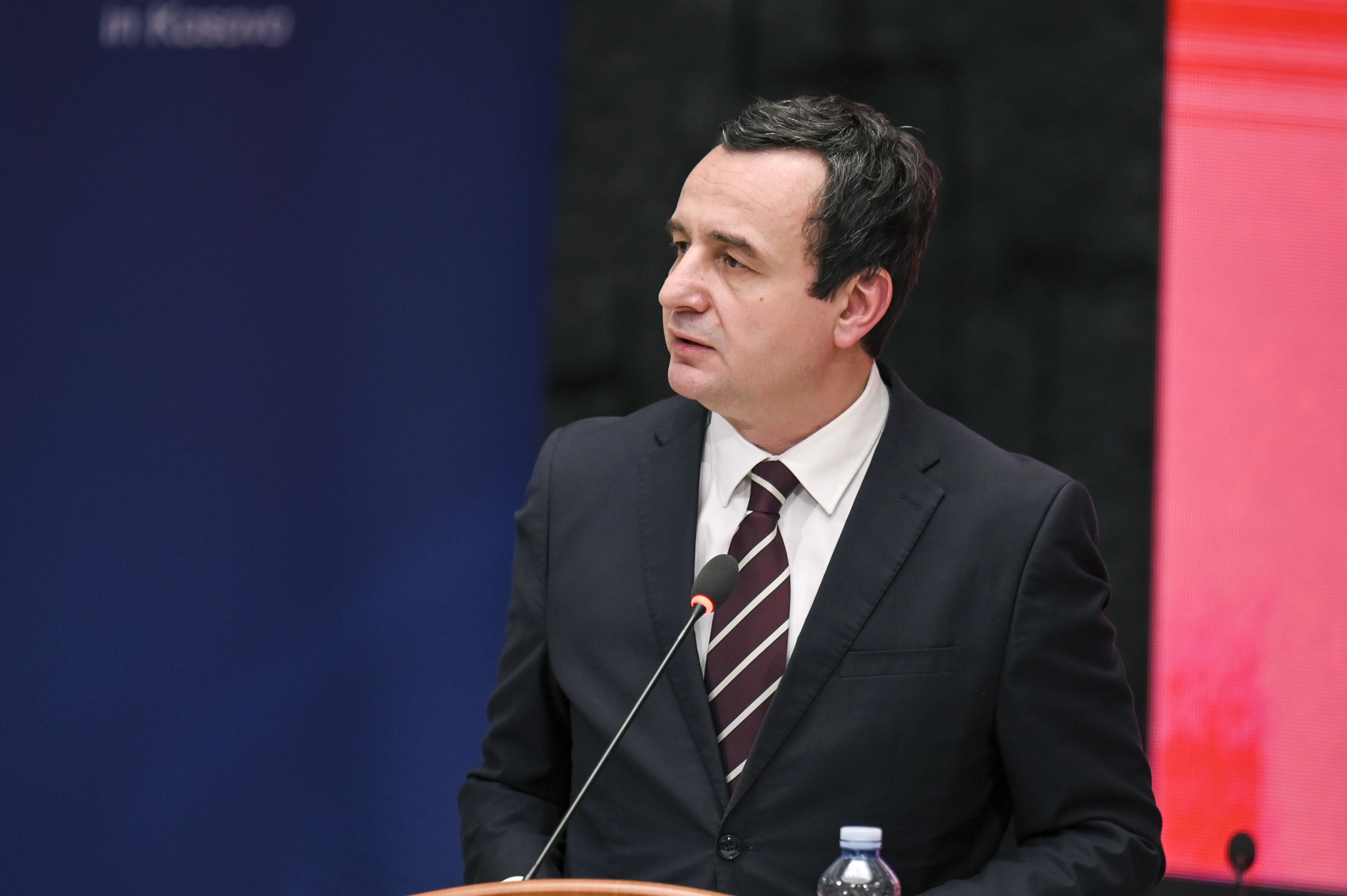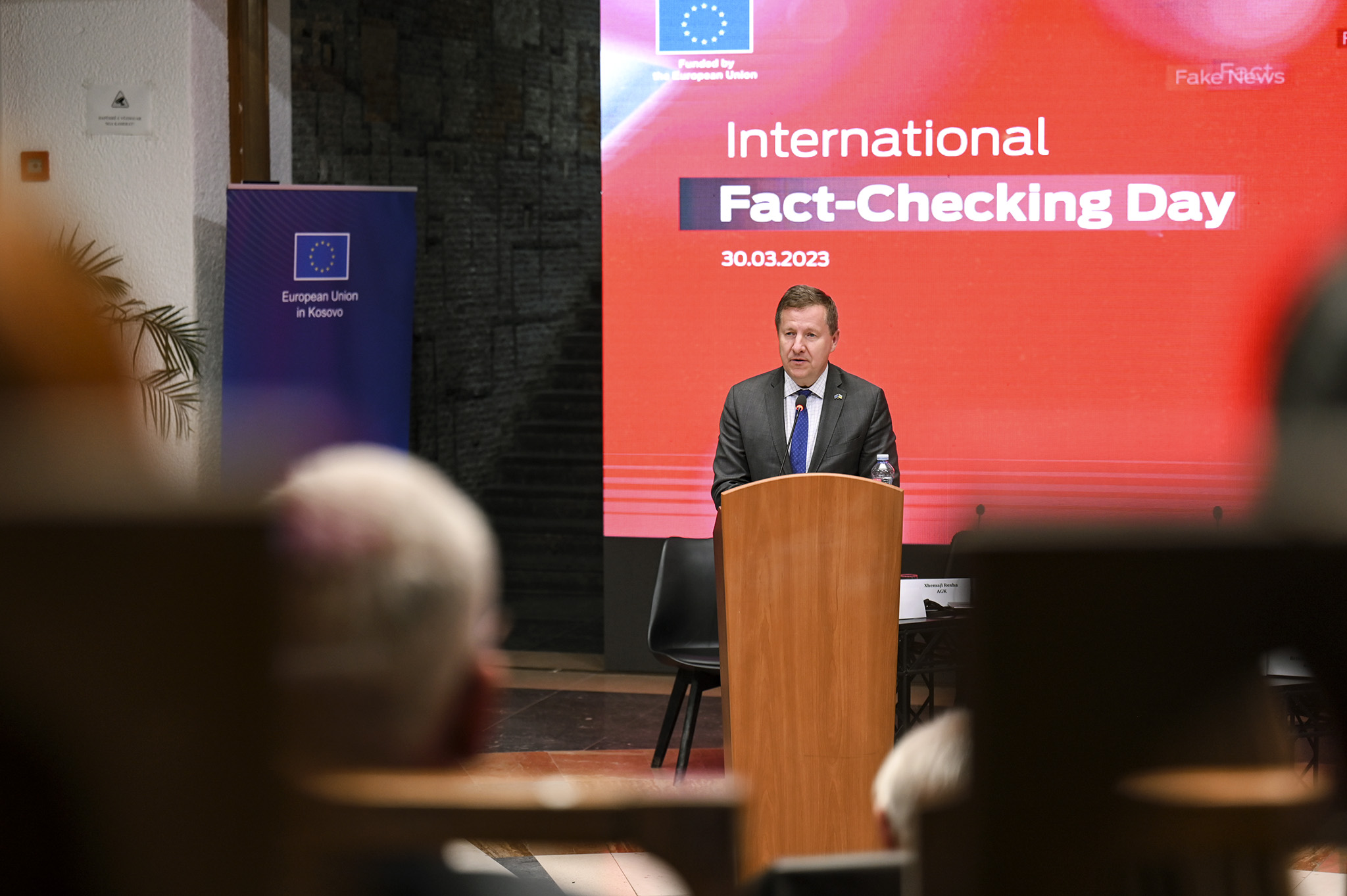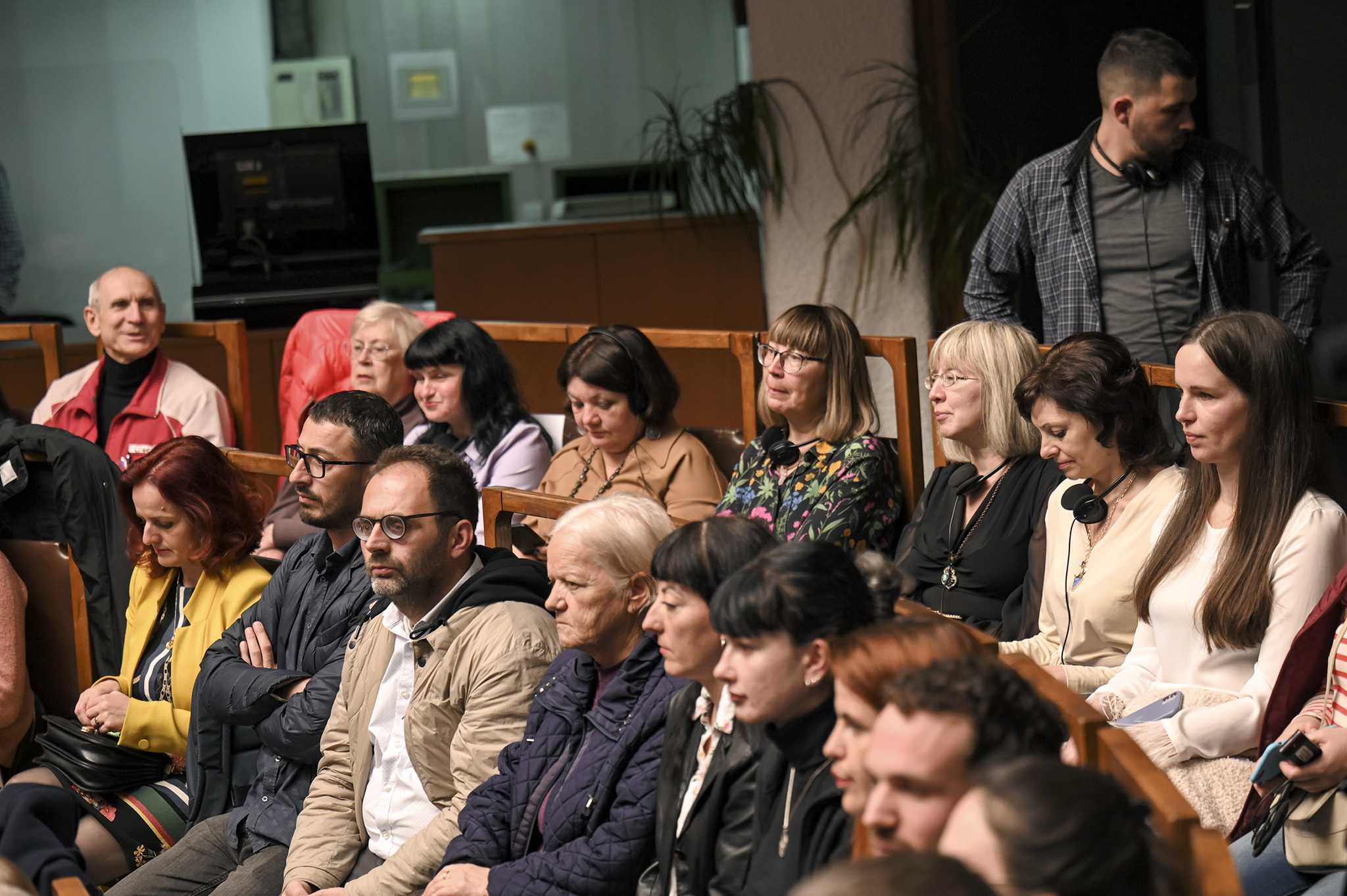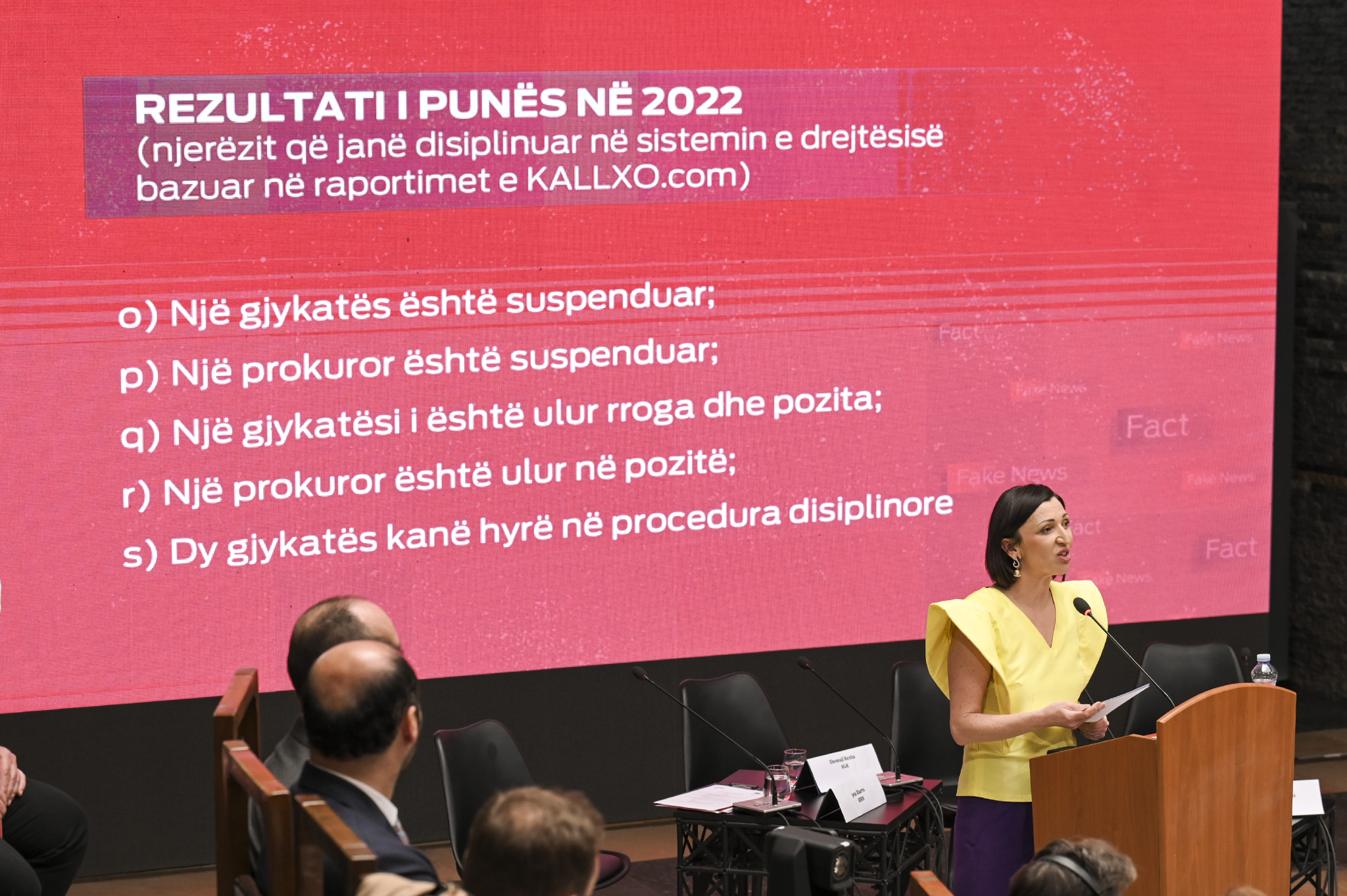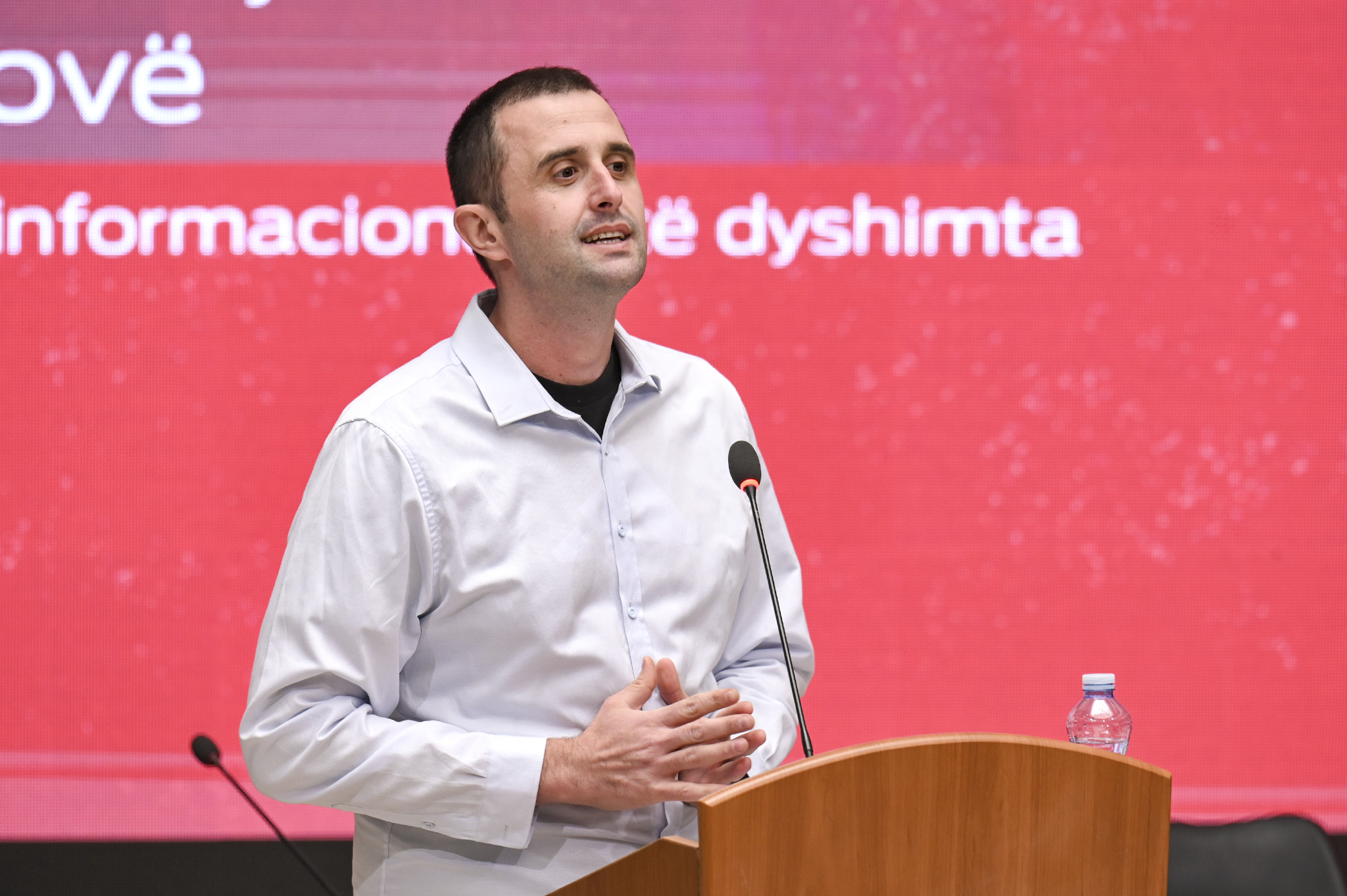Prishtina, 30 March, 2023
The Prime Minister of the Republic of Kosovo, Albin Kurti, participated in the Marking of the International Fact-Checking Day.
The prime minister started his speech with the inter-epoch comparison, as he called it, to create an image of how much the ways of conveying news have changed from the place of the event to the public. “In contemporary political life, nothing has compressed public discourse more than the almost frenetic acceleration of the flow of news and information. If only a century ago, people went to the cinema to watch state-run film chronicles shot on the war fronts days ago, today people can follow the fighting from the fronts in Ukraine in real time, through live broadcasts,” said the prime minister.
Recalling the rapid technological development, the prime minister said that the semiotic relationship between the sender of the message, that is, the media, and its recipient, the public, was a one-way and very clear relationship. But when this ratio was overturned by technological inventions and their massification, the roles were reversed. The figure of the journalist and that of the public were exchanged between them, creating a new relationship, where the public could also report and do the journalist, and where the journalist could find himself in the position of the public in front of his traditional public, from the source the information was returned to his direct transmitter.
Prime Minister Kurti said that he feels happy to see that such meetings are being organized in Kosovo to mark the International Fact-Checking Day, fixed on April 2. Because apparently, in our time, the old German expression, “Trust and verify”, needs a verification as well, from “Trust and verify” to “Verify and believe”!
“Whenever there is talk about the right to report freely, I am happy to affirm that I am at the head of the government of a country where media freedom is an example for countries in the region and beyond, as it is also affirmed in international reports,” he said. Prime Minister Kurti and added that Kosovo is an example for free speech and progressive developments for media freedom.
Prime Minister Kurti’s complete speech:
Dear Executive Director of Balkan Investigative Reporting Network – BIRN, Jeta Xharra,
The Honorable Ambassador of the European Union in Kosovo, Tomas Szunyog,
Dear ambassadors and heads of diplomatic missions in Kosovo,
Dear journalists, editors, reporters and cameramen,
Dear members of parliament, ministers and deputy ministers and mayors of municipalities,
Dear representatives of local and international organizations,
Dear attendees,
Ladies and gentleman,
In contemporary political life, nothing has compressed public discourse more than the almost frenetic acceleration of the circulation of news and information. If only a century ago, people went to the cinema to watch state-run film chronicles shot on the war fronts days ago, today people can follow the fighting from the fronts in Ukraine in real time, through live broadcasts.
I believe that even this inter-epoch comparison is enough to create an image of how much the ways of conveying news have changed from the place of the event to the public. This, since we are already living the third decade since the modern world has moved from the mass media to the mass media.
Until the beginning of the 21st century, information and news were produced and passed from a countable unit of traditional media to a large mass of people who represented the audience of these media. So, on one side were the written press, radios and televisions, which due to their relatively limited number could all be known by the majority, while on the other side was their public, consisting of readers, listeners and viewers.
As long as the news circulated in this way, the semiotic relationship between the sender of the message, that is, the media, and its receiver, the public, was a one-way and very clear relationship. But when this ratio was overturned by technological inventions and their massification, the roles were reversed. The figure of the journalist and that of the public were exchanged between them, creating a new relationship, where the public could also report and do the journalist, and where the journalist could find himself in the position of the public in front of his traditional public, from the source the information was returned to his direct transmitter.
If in that past time there was a risk that in a media environment where the media were very few in number, information could be controlled and news could be censored by the political powers, today when the media are numerically much more numerous, there is a risk of producing more large and easier distribution of fake news.
In the endless universe of cyberspace, where each of us swims like a cybernaut through online platforms and social networks such as YouTube, Facebook, Instagram and Tweeter, and others, passing through millions and millions of information, it is clearly very difficult to navigate . The sophistication of the production and distribution of fake news to the public has meant that the lines that define the boundaries between fake news and real news need a trained eye and a sharp mind to discern.
So today, when we are all so regularly exposed to fake news, I am glad to see that such meetings are being organized in Kosovo to mark the International Fact-Checking Day, fixed on April 2. Because apparently, in our time, that old German expression, “Believe and verify”, needs a verification as well, from “Believe and verify” to “Verify and believe”!
In this information ecosystem contaminated by fake news that conveys untruths or half-truths, international initiatives to protect the public from fake news, such as the one initiated by the International Fact-Checking Network (IFCN), are opening a new front in the old war against lies and propaganda. And at this point, the message could be this: Nothing new from the fake news front!
Because since the 19th century, when daily newspapers became popular across Europe, fake news has been a challenge for the public. But it was the massification of the media that inevitably also massified fake news, in the face of which, verification techniques are expected to be a vaccination against fake news viruses. Just like the fake news about vaccines and the Corona virus that flooded the world during the last three years, where our population was also a victim. But to produce the vaccine against the virus of fake news, there is a particular need to go through a sociology of television and an anthropology of media, through which we could understand the social phenomena and cultural particularities through which fake news circulates.
The creation of the Code of Principles by the IFCN, I believe, can really help in the development of international standards for fact-checking methods. Because this also comes as a need of the time that the 5 questions starting with W: Who, What, When, Where, Why, or who, what, when, where and why, need a “double-checking” or a verification double. And for such a thing, the professional commitment and public activism, especially of journalists and communication science researchers, is necessary, as we are seeing here today.
Truth and reliability go together as values but also practically and concretely all the time and everywhere. As the Italian philosopher Gloria Origi says, “The age of information is because it becomes the age of reputation”, so the age of information is the age of reputation.
Whenever there is talk about the right to report freely, I am happy to affirm that I am at the head of a government of a country where media freedom is an example for the countries of the region and beyond, as it is also affirmed in international reports. Starting from the freedom enjoyed by the media in Kosovo, it is enough to look at journalism in our immediate neighborhood to understand what I am talking about. Once upon a time, from the years of the Second World War until the Kosovo war, the governments of dictatorial countries had propaganda ministers, and today, their remnants deny war crimes and tolerate the distribution of fake news about the war in Ukraine.
The production and distribution of fake news, especially in extraordinary times such as these last three years after the outbreak of the Corona Virus pandemic and after the invasion of Ukraine by Russian troops, are challenges for the national security of the states and for the international security environment. . In such a habitat where information filters for cleaning from fake news are so vulnerable, every contribution to maintaining a healthy media and informational ecosystem is a contribution to the protection of human rights and freedoms, democracy and freedom.
Here I would have mentioned a saying of the philosopher I like Walter Benjamin, he says that opinions are private matters, the public has an interest in judgments. So opinions are private matters, the public has an interest in judgments. However, this separation of opinions and judgments is no longer simple, because there are opinions that are clothed in the guise of a judicial authority for a case and there are also judicial authorities that are believed to be competent as they give their judgments. , we actually understand that they are simple opinions.
It is very important to study and evaluate this triangle of news, opinion, and judgment.
I am very sorry to note that, since two years ago, Kosovo is perhaps the only country in Europe that does not have any printed newspaper. But I am glad to note that Kosovo has such a large number of online media and a pluralism of information sources, which can be used positively as a suitable condition for news verification.
Today, the production and distribution of fake news is one of the most powerful weapons in the hybrid war, where Russia, with its authoritarian government, is the champion of propaganda. The countries of the Balkans, including Kosovo, have been a constant target of Russian propaganda with premeditated destabilizing disinformation about the region as well as fake news about the developments on the Ukrainian fronts. In the front against fake news about the war in Ukraine, we, as the Government of Kosovo, have lined up from the beginning alongside the countries of the European Union, the countries of Europe, and the United States of America.
In cooperation with the Association of Journalists of Kosovo, we have supported special programs for housing and providing living and working conditions for a group of journalists from Ukraine and recently also for journalists from Afghanistan. For this and all the measurable indicators of the media environment in our country, I am glad that our common country Kosovo is an example for free speech and progressive developments for media freedom, but as we are seeing today and not only today fighting fake news. And this is not a fake news! It is not fake news itself. Because this is a verifiable fact. All of you and I here, and others who follow us through the Internet, those of us who have gathered to discuss the international principles of fact-checking, and those others who listen to us, become witnesses together!
Thank you!
Last modified: March 31, 2023
